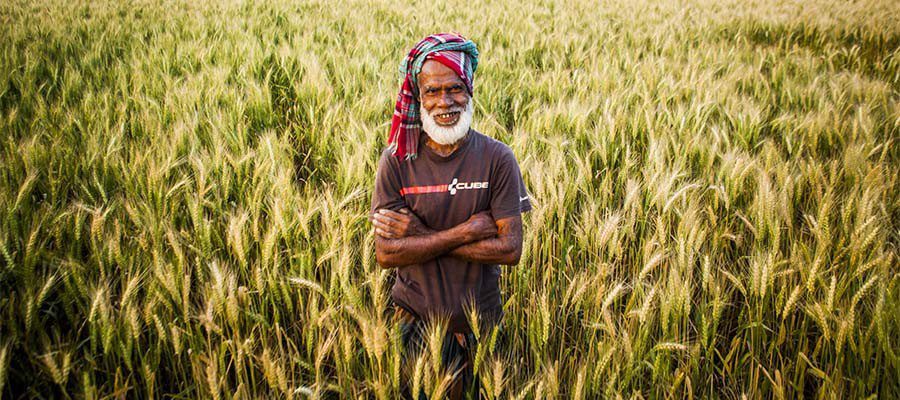
Prospect of Agribusiness in Bangladesh
Agri-business in Bangladesh still remains a largely untapped area for diversification of economic activities. It has not developed properly, considering the country’s prospects in this particular field. The economy is largely dependent on agriculture, though the sector’s share in the country’s gross domestic product (GDP) has steadily been on the decline. This is, however, not entirely unexpected for a developing nation. Yet then, over three-fourths of the total population in Bangladesh live in rural areas. Most of such rural people are directly or indirectly engaged in a wide range of agricultural activities. Agriculture contributes significantly to the country’s GDP. About 57 percent of the country’s labor force is absorbed in the crop sector alone.
The number of large, medium, and small agro-based firms is quite limited in this country to about 150 million. Out of such firms, only a few ones could make headway in agri-business. Two or three such firms are exporting the country’s agro-products to the overseas market. On its part, the government has offered some incentives, direct and indirect ones, to grow agri-business in the country. But no significant amount of investment has so far been named either by the public or the private sector here.
The areas of agri-business have already been identified. These are cold storage facilities serving the supply chain, especially the production of fresh produce for both home and export markets, reduction of the use of chemical fertilizers, cultivation of seeds, eco-friendly jute production that is supported by jute technology development institutes, shrimp farming, ‘Halal’ foods, milk and dairy products, high value-added foods for export, including herbs, spices, nuts, and pulses. In this context, the United States befittingly came up with a model for agri-business in Bangladesh the other day. It has teamed up with the BRAC Bank in replicating or adapting the model in Bangladesh.
The government of Bangladesh has been proactive about encouraging the development of the agricultural sector by increasing productivity in the crop sector and raising the output of non-crop agriculture. To achieve this, it provides increased credit and facilitates greater access to inputs and modern technology.
The government has come up with the following incentives:
- The liquefy Entrepreneurship Fund for the development of the agri-business industry.
- Special loan facilities available to set up an agri-business venture,
- Agri-business industry enjoys tax holidays,
- Any investment in this sector will enjoy similar tax amnesty as available in other sectors.
- The imposition of supplementary duty on mangoes, oranges, grapes, apples, dates, and others encourages high quality and cheaper local resources.
- Cash incentives have been given to the exporters in various sub-sectors.
- Strengthening producer organizations can significantly help the farmers, and a variety of other institutions can provide alternative fora for dispute resolution Associations formed around
- Professions, industries, and commodities are likely to play an essential role in developing agro-business in the country/Effective producer groups often enable small-scale farmers to forge mutually beneficial partnerships with private industries.
- While the private sector will continue to take the lead in developing high-value agriculture and related agro-business, the role of government remains essential/It is critical for fostering an enabling business environment for market-Icd growth through stable and undistorted economic incentives and in providing necessary public goods and services.
The public sector’s regulatory role is also significant in ensuring that high-value agriculture and agro-business growth does not deepen poverty, accentuate prevailing inequities, or harm the environment. Closer collaboration among the public sector, non-governmental organizations (NGOs), and the private sector would be highly beneficial in addressing the combinations of opportunities, risks, and challenges that the shift to high-value agriculture carries for Bangladesh.
However, here one basic fact must not be just sight of, Bangladesh is a land-scarce country. Given its geographical size, its density of population is the highest in the world among the nation (Jutes). Given the need for keeping at least one-seventh of its land size for forest coverage in one way or another, the arable land in the country gets further limited. The scarcity of land for agricultural use is becoming a serious problem because of competing demands on the existing land and area by the new needs for dwellings, infrastructure-building purposes, urbanization, etc. Furthermore, the river erosion problem continues to cause a sizable loss of landmass in different parts of the country.
There is an urgent need to draw up a proper land-use plan and implement it in carnets, given this situation. Otherwise, the prospects for the flourishment of agro-business will be a binding constraint.
Risks/Problems/Challenges Agribusiness in Bangladesh
- Lack of quality control mechanisms and standardization of products.
- Inadequate port facility.
- Inadequate air freight space for export of perishables.
- Irregular power supply.
- Inadequate market information.
- Insufficient supply of good quality seeds/fingerlings/DOC/breed.
- Indiscriminate use of chemical fertilizer reducing soil fertility.
- High level of post-harvest loss (10-38%).
- Inadequate cold storage facility for vegetables.
- Lack of packaging facility to meet up the international standard.
- Lack of knowledge of industry about EurepGap, HACCP.
- The reluctance of financial institutions to finance agribusiness.
- Inadequate air space for fresh product export.
- The limited capacity of the Bangladesh Standard Testing Institute for standard-setting and monitoring.
- A Major challenge for the agribusiness sector of Bangladesh, especially for the export market, would comply with the SPS requirements.
- The threat to small farmers due to the irregular supply of raw materials.




No comments:
Post a Comment